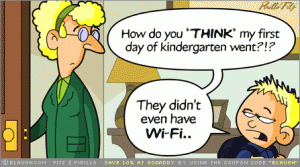While I was going through the course materials of the first week of LIBR 559M, many scenarios of students using social media tools in library settings flashed to my mind. I started to think, perhaps, I could write something about my observations of students’ behaviour in library contexts.
When I pass by the library, most often, I notice students are connected on the Web. They may not crowd together in small groups physically. (It is a collaborative working area of the library, therefore, grouping is allowed.) Rather, they enjoy the “quietness” of being alone. They usually have several browsers opened on their computers and keep switching over– checking any news feeds from Facebook, making new friends, looking at photos, chatting with friends on msn or meebo, having headphones plugging in for listening to music from their ipods or watching YouTube online. They seem to enjoy very much their businesses online and multitasking. They are typical “Digital Natives” – children who were born into and raised in the digital world. This term is not new to me. Still, many questions started to spin in my head.
……Why are they keeping themselves so busy? Are they using these social media tools for school-related activities? Are they aware of any privacy issues of disclosing their identities online? Or if they know about it, are they paying attention to these issues at all?…….
The more I think, the more I feel annoyed. Why don’t they come to the reference desk and ask questions? How do their behaviours shape the directions of libraries? Eventually, will the physical localities of various service points of libraries no longer needed in the long run? And how do I and probably many other library fellows who are “Digital immigrants”, accommodate to these new generations?
It is true that digital natives prefer talking virtually online than communicating with a live person. Perhaps they are shy? May be not. Perhaps they get used to text-based style of communication? I think so. This is their current style of communicating.
In a recent report, it states that “Young people who constantly swap and share personal information through networks today are likely to value sharing over privacy even as they age.” And that “keeping information to yourself is going to be seen as antisocial” (CBC, 2010).
Perhaps, it’s time to change.
CBC. (2010). Online sharing winning out over privacy: report.Retrieved from http://www.cbc.ca/technology/story/2010/07/09/technology-privacy-sharing-online-internet-pew.html#ixzz0trnuXZNe
Pew Research Center (2010). Millennials will make online sharing in networks a lifelong habit. Retrieved from http://pewinternet.org/~/media/Files/Reports/2010/PIP_Future_Of_Millennials.pdf
Prensky, M. (2010). The longer view: why you tube matters. Retrieved from http://www.marcprensky.com/writing/Prensky-Why_You_Tube_Matters-01.pdf

